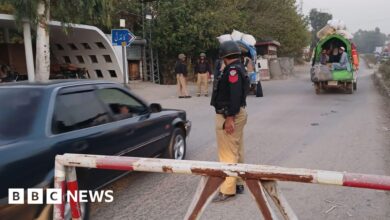‘Trust and respect’ nourishes the success of interfaith rice farming in the Philippines

The Liton, Kibales, Magatos Irrigation Cooperative Association (LKM-IA) has been supported by the Food and Agriculture Organization of the United Nations (FAO) with funding from the Korea International Cooperation Agency (KOICA).
These communities live just a few hundred meters apart near Kabacan in the central island of Midanao, an area that has seen separatist violence for years and is now moving towards a more significant degree of community autonomy. Muslims are the majority.
In front of International Day of Cooperatives Marked annually on July 1, UN News’s Daniel Dickinson traveled to Kabacan and met two members of the LKM-IA, Treasurer Marcializa Calud, a Christian, and Mona Usman, a Muslim and working auditor.
Marcializa Calud: The association started in 2015 with just 250 pesos ($4) and last year our revenue was $1.65 million ($28,000). Careful planning and management have helped us grow and this has been reinforced with support from KOICA and Food and Agriculture Organization including seed fertilizers as well as machinery.

Marcializa Calud stands in front of the new rice mill.
Mona Usman: The association receives machinery for each step of the rice planting and harvesting process; rotary machines to plow fields, combine harvesters to bring in rice, and milling machines to process rice.
Marcializa Calud: Rental machinery to our members has increased productivity significantly. It takes a whole day to plow a one-hectare field by hand with a water buffalo, but only an hour using a plow.
Harvesting rice by hand in the same field takes about two days, but only one to two hours if a combine harvester is used. My income from the rice fields increased from 20,000 pesos ($340) to 24,000 pesos ($410), a significant amount.
Mona Usman: Before the cooperative existed, we had to rent a combine harvester from a private lender and they took 10% of the crop value as payment, while we kept 90%.

Mona Usman and her family.
Since we established the cooperative and bought our own harvester, nine percent goes to the association and currently each farmer receives 91 percent. That extra percent makes a big difference. Meanwhile, with our contribution, the association can pay for the irrigation we need because our crops are not watered with rainwater.
Marcializa Calud: What we are most worried about is the water source because we are located downstream of other communities.
During the recent El Nino climate events when there is less water, we have to negotiate with our upstream neighbors to release enough water for our needs. Luckily, we get along, so this is not an issue, but climate change is still a concern for all rice growers, because the crop grows on wet rice fields.

Rice is milled by Liton, Kibales, Magatos Irrigation Association.
Mona Usman: We are an association and we represent two religions, Islam and Christianity. My grandfather was a Muhajadeen who fought for our land. He later became a convert and welcomed Christian settlers to Bangsamoro, a predominantly Muslim region in the southwest of the island of Mindanao.
So there is trust and respect between communities because of this historical connection.

Mosque in Liton.
Marcializa Calud: We rarely talk about being a Christian and Muslim association. Our ancestors respected each other’s religion and culture, so we never argued. Today, my children play together with Mona’s sons and daughters.
Mona Usman: The perception of those who believe that Christians and Muslims cannot get along is wrong. There were no conflicts, only mutual respect and this is the legacy that we have passed on to our children, grandchildren and classmates.

Church in Kibales.
Marcializa Calud: There is a saying among farmers here that when the harvest comes we speak English. We say “short, failure, overdraft”. Short, because after paying the bills, we are short of money, failure, because another harvest did not bring in enough money, and overdraft, because we need to borrow money to survive. However, with the new machinery, this is no longer the case and we are making money.
Mona Usman: We are making progress in this community, but it is still difficult to balance the books. We want to make sure that everyone in the community has access to health care, that their children go to school, and that they eat three meals a day. And most of all, we want peace.




